The £40 million blow: how affordability checks are already hitting horseracing
Industry editor Bill Barber examines the effect checks are having on racing

Two weeks ago, representatives of the British racing industry met with Gambling Commission officials for crunch talks. They told them not just about the huge impact intrusive affordability checks could have on the sport – but the significant damage they are already doing.
One of racing's leaders present at the talks estimates that digital turnover on British horseracing has declined by £800 million this year. The cost to racing's revenues based on that is put at £40m a year, money the sport can scarce afford as it attempts to recover from the financial blow from Covid-19 lockdowns and struggles to compete with better resourced jurisdictions abroad.
Arena Racing Company's (Arc) chief executive Martin Cruddace this week revealed the brutal impact of affordability checks on betting turnover on the racing taking place at the group's 16 courses this year.
Cruddace, who acknowledged that other factors such as the rising cost of living would have played a part, explained his figures were in comparison to 2019, as 2020 and 2021 were affected by Covid-19.
He said: "The turnover data on Arc's fixtures shows that, against 2019, the first quarter of 2022 is -14 per cent, the second quarter -23 per cent and the third quarter -23 per cent. At these rates we estimate digital turnover on horseracing from Arc racecourses to be down £280m versus 2019.
"Reflected across the whole industry, that would represent a decline of £800m this year."
Cruddace added: "The most important thing is that it is not possible that a 20 per cent decline is a result of problem gamblers being taken out of the system and it's problem gambling money."
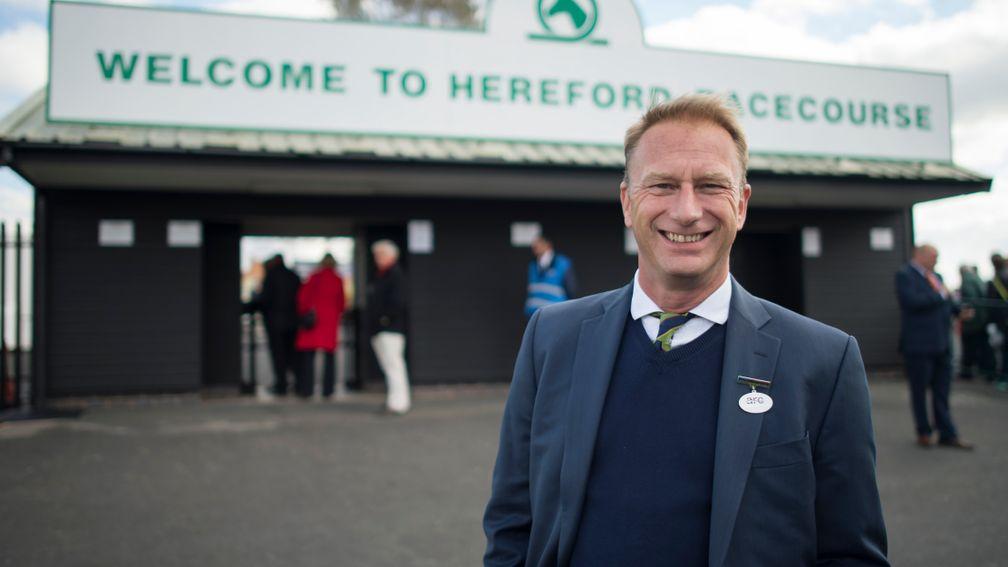
Campaigners have proposed that affordability checks, which involve customers being asked for proof of income such as bank statements, tax returns and P60s, be imposed at as low a level as a net monthly loss of £100 – a figure also mentioned in a Gambling Commission consultation launched in 2020.
The hit to British racing if that were to happen would be enormous, with estimates the resulting annual loss of revenues for the sport could range from £60m to £100m.
Ministers have moved to assure both the betting and racing industries that affordability checks would be proportionate and triggered at levels nowhere near as low as £100. However, due to a lack of clarity from the Gambling Commission, which licenses and regulates operators in Britain, operators, while not launching checks at such a low figure, have been forced to carry out increasingly heavy-handed checks for fear of hefty financial punishment.
And Cruddace estimated that the financial impact to racing of those checks that are already taking place is considerable, a hammer blow for a sport that is still trying to recover from the financial impact of Covid-19, with racecourses estimated to have lost more than £400m in revenues across 2020 and 2021.
Cruddace said: "At a 25 per cent reduction across the board you are looking at close to £40m [a year] to the British horseracing industry.
"The point I was making was just when we came out of Covid, we had a good story to tell, we are about to be able to compete more with Ireland and France. This regulation is basically taking the rug from underneath our feet and the racing industry is going to fall back again.
"You are just losing momentum against other jurisdictions. It's pretty pointless for us as an industry to have very constructive discussions about restructuring when we are haemorrhaging betting turnover, which is the key funding model for this sport."
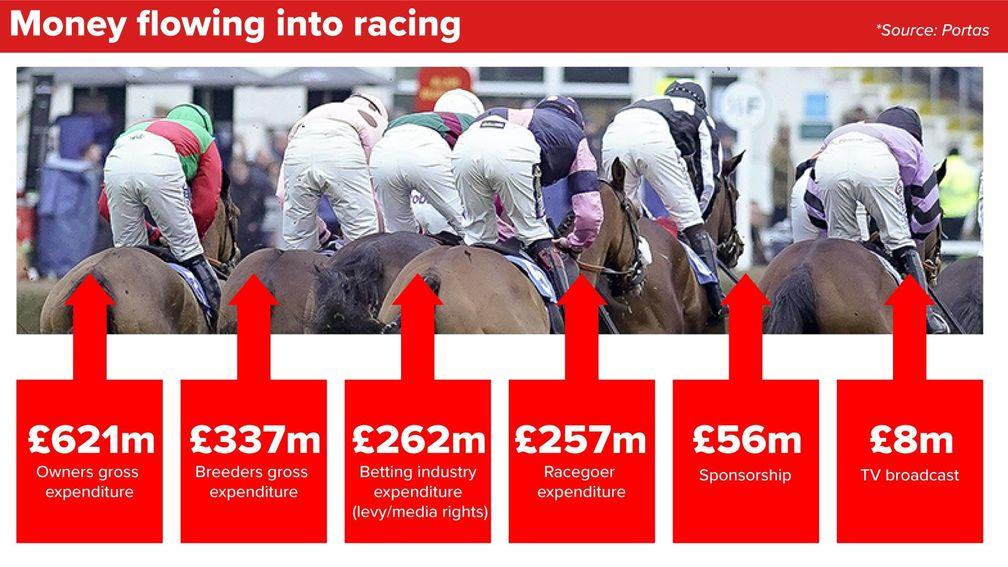
British racing's reliance on the betting industry cannot be overstated.
Cruddace pointed to bookmakers agreeing to increase the contribution they made from streaming deals to help keep the sport afloat during the Covid lockdowns of 2020, saying: "It is just a short time ago, and worth the government bearing in mind, that during Covid, alongside the ongoing investment from the industry’s own stakeholders, the betting industry stepped up to the plate and kept our industry from life support."
In recent weeks, British racing's leaders have made what seems to be a major breakthrough in tackling the huge issues facing the sport such as declining field sizes and uncompetitive prize-money, agreeing a new governance structure and embarking on work to create a long-term industry strategy.
However, all that good work threatens to be underdone by the uncertainty and damage being caused by affordability checks.
BHA chief executive Julie Harrington admitted: "We are looking at growth and future investment and it's difficult to do that in an uncertain world."
The governing body has been pressing racing's case on affordability checks with both ministers and the gambling industry regulator.
Harrington added: "Any intrusive affordability steps would undoubtedly have an impact on the money coming into the sport and I believe we still have an opportunity to support the Gambling Commission and government in making sure that they are intelligent and targeted."
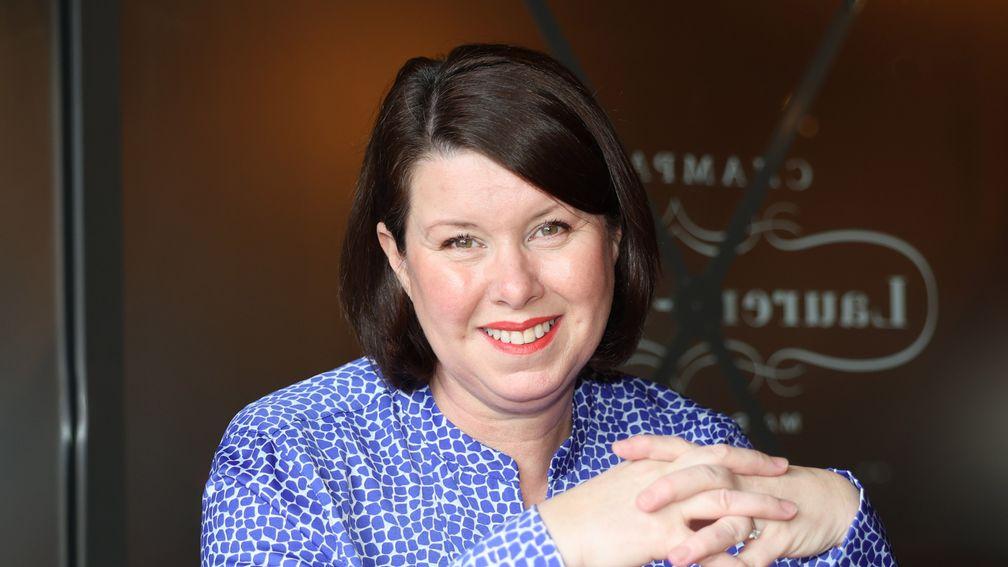
Arc is not the only commercial body within British racing feeling the impact of affordability checks.
Martin Stevenson, chief executive of Racecourse Media Group – the umbrella commercial organisation for the 34 tracks which hold an interest in Racing TV – said: "RMG has seen a material decline in online betting turnover since the early summer.
"While a number of factors could be affecting this such as field sizes and the wider economy, it is, however, striking that betting shop turnover is performing well, which is suggestive that affordability checks are impacting turnover."
That decline in turnover, according to Stevenson, is evidence indicating a "very material effect on racing’s funding" and a move from punters to betting with black market bookmakers.
He added: "The evidence we have seen suggests that, in particular, higher-staking punters are not betting as much on horseracing. Alongside that, there is much anecdotal evidence that high-staking punters are now betting offshore to avoid affordability checks.
"This is a particular concern not just due to the effect on racing's funding but also that affordability checks are moving punters out of the UK-regulated environment – and protection from harm – which must be the opposite to what affordability checks were set out to achieve."
The Gambling Commission has played down the threat of the black market when it has been raised by bookmakers. Last year, the Betting and Gaming Council published figures from a report compiled by PwC that claimed the number of customers using an unlicensed betting website has grown to 460,000 from 210,000 over two years, with the money staked doubling to £2.8bn. Like Stevenson, Cruddace believes it has to be taken seriously.
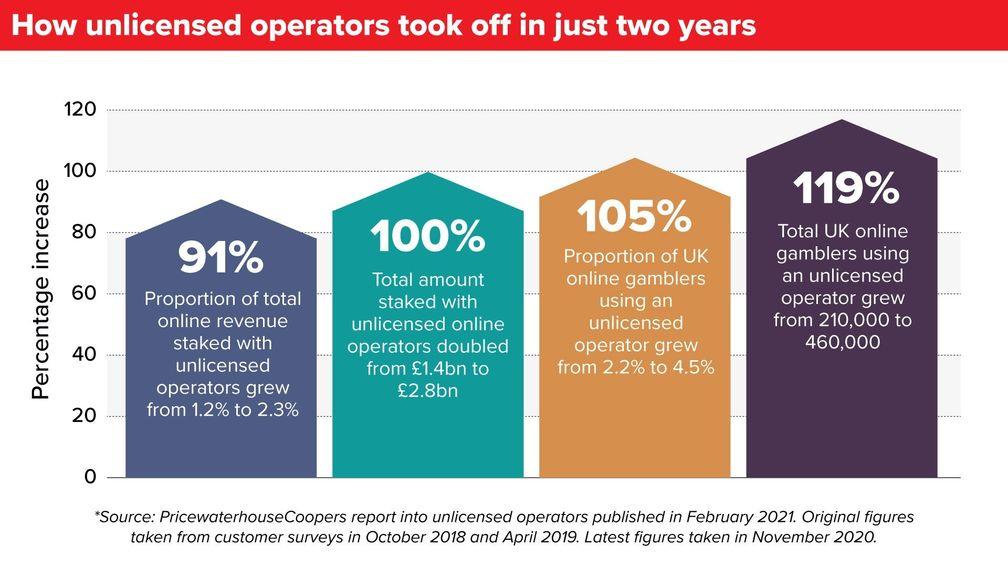
He said: "My question to the Gambling Commission would be to ask what work are they doing to say where has this money gone?
"It's hundreds of millions of pounds and, yes, some is the loss of high-stakes customers, but it is lazy to suggest high stakes necessarily equals problem gambling. The point about high-stakes punters is they are the one cohort which is able to very easily find alternative avenues to place their bets."
Cruddace who has subsequently written to the Gambling Commission to further outline his concerns, added: "They are then being taken out of any responsible gambling safety net, they are being taken out of the levy, the sport benefits from zero media rights income, and they are being taken out of the tax system. With regulation you have to have a sweet spot and if you over-regulate what happens is you shrink the market you wish to regulate."
Further evidence to back up Stevenson's claim that higher-staking customers are beginning to desert racing came from Phil Walker, UK managing director for William Hill's owner 888.
Racing attracts more higher-staking singles business than football, which is more recreational, is based more on multiple bets and has smaller staking patterns.
"It has definitely had an impact on racing already," Walker said. "We need to see the detail in the white paper but depending on if there are blanket limits in the white paper set at a very low level then I think they could impact racing quite heavily in the future.
"It's really important that people understand this is not targeted at racing but it will impact racing because all customers online will be affected. That's why we are really keen to get a level playing field and consistent regulation in place that is predictable and fair for everybody across the whole industry.
"We understand and share our customers' frustration with intrusive checks, and are doing everything we can to ensure that we can protect player safety without having to ask for extensive personal details."
There has been backing across racing of the need for the government's review to update regulation put in place before the explosion of online betting and the need to protect the vulnerable from harm.
But Harrington said affordability checks should be proportionate, "because we know the vast majority of people who these checks would be imposed on don't have a problem and wouldn't be described as at risk from gambling-related harm".
That view is echoed by Stevenson, who said: "We support the review in terms of bringing it into the digital age and absolutely endorse the importance of protecting vulnerable individuals from gambling-related harm, but we've always said it is vital that any new legislation is proportionate, targeted and evidence-based."
Earlier this year RMG provided those on its database and the databases of its racecourse shareholders with the facility to write to their local MPs seeking assurances in Westminster that any future gambling regulation would not impinge on their civil liberties or enjoyment of horseracing, and as a consequence result in any unintended economic consequences to the sport.
More than 9,000 emails were sent and Stevenson said: "This high level of response indicates how strongly punters and racing fans feel on the subject."
RMG also surveyed Racing TV members resulting in more than 2,000 responses, which Stevenson said "demonstrated overwhelmingly strong views in opposition to mooted reforms".
More than 95 per cent stated that they would not be happy for bookmakers to have access to their bank accounts to determine affordability, while 88 per cent stated that they should have the freedom to choose how much they bet without government interference.
Stevenson added: "We think it is essential that the review of the Gambling Act takes account of the views of punters who are likely to be affected in their enjoyment of betting."

British racing's leadership continues to lobby both the government and the Gambling Commission in order to get across the unintended financial consequences of the blunt instrument of blanket, intrusive affordability checks.
However, they are having to deal with politicians, regulators and campaigners who have a lack of understanding of the way both the betting industry works and the way British racing's income flows from the sector.
A recent example came in a debate in the House of Lords Grand Committee on the horseracing industry last month.
Liberal Democrat peer Lord Foster of Bath, a leading campaigner for gambling reform, claimed the impact of affordability proposals on horseracing would be limited because they are targeted at "online gambling".
"No checks would take place at a racecourse under the proposals, so traditional gambling at the racetrack would not be affected," he added, seemingly unaware of the huge importance of online gambling to British racing's finances.
Harrington said: "One of the areas where I hope we can have productive conversations with both government and the Gambling Commission is what do they actually mean by affordability checks and how they would work in practice?
"We have always said while we are supportive we think any interventions should be proportionate and it has become pretty apparent during conversations that the vehicle for how they may be delivered certainly hasn't been fully developed."
However, Harrington believes racing's message is beginning to get through. She said: "I think both ourselves and other interested parties have got the opportunity to influence those who perhaps know less about how gambling actually works to keep it proportionate, to try to avoid the obvious risks of people simply going and spending their money in a way they find less intrusive.
"We have an opportunity to help them find a solution and so far we are encouraged by their willingness to engage on that."
Further talks are set to take place as the wait for the government's gambling white paper continues. One thing that can be said with certainty is that the debate will not end when it is finally published.
British racing's leaders will be hoping that both ministers and the Gambling Commission fully understand the plight British racing faces. If they do not, the impact on a sport facing crises on multiple fronts will be catastrophic.
Read more from this series:
Part one: an existential threat - how did affordability checks become such a big issue?
Part two: 'I'm very close to giving up' - the punters suffering from affordability checks
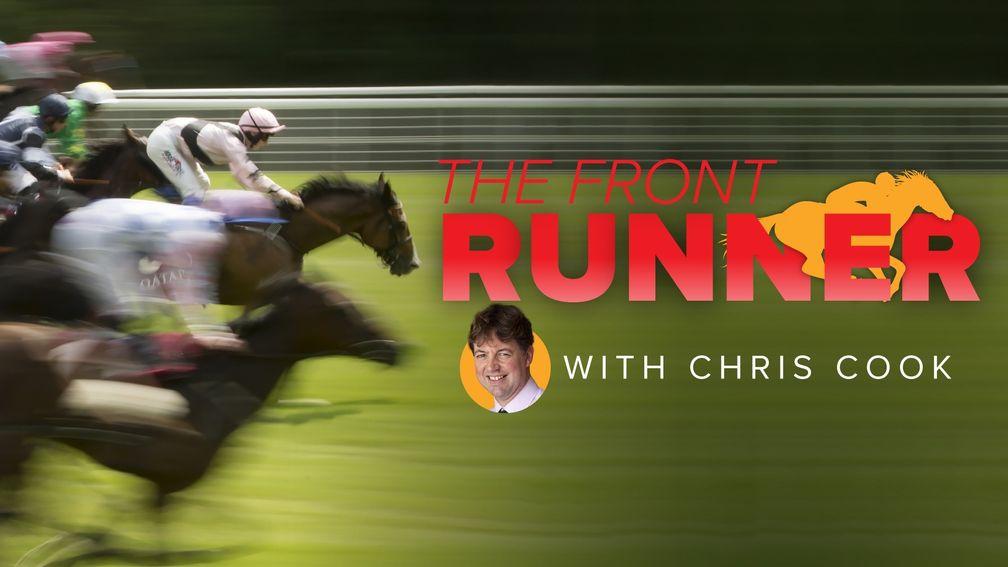
The Front Runner is our latest email newsletter available exclusively to Members' Club Ultimate subscribers. Chris Cook, a four-time Racing Reporter of the Year award winner, provides his take on the day's biggest stories and tips for the upcoming racing every morning from Monday to Friday. Not a Members' Club Ultimate subscriber? Click here to join today and also receive our Ultimate Daily emails plus our full range of fantastic website and newspaper content
Published on inSeries
Last updated
- We believed Dancing Brave could fly - and then he took off to prove it
- 'Don't wind up bookmakers - you might feel clever but your accounts won't last'
- 'There wouldn't be a day I don't think about those boys and their families'
- 'You want a bit of noise, a bit of life - and you have to be fair to punters'
- 'I take flak and it frustrates me - but I'm not going to wreck another horse'
- We believed Dancing Brave could fly - and then he took off to prove it
- 'Don't wind up bookmakers - you might feel clever but your accounts won't last'
- 'There wouldn't be a day I don't think about those boys and their families'
- 'You want a bit of noise, a bit of life - and you have to be fair to punters'
- 'I take flak and it frustrates me - but I'm not going to wreck another horse'